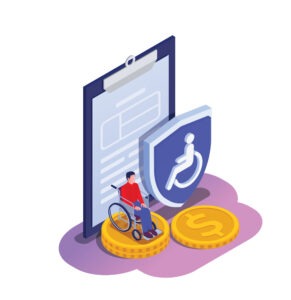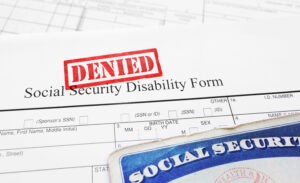
You could receive Supplemental Security Income (SSI), in addition to Social Security Disability Insurance (SSDI), if you meet the qualifications for both programs. Because SSDI qualifies as unearned income, these benefits count toward the income limits for SSI. This means you must qualify for a low benefit amount to receive both SSI and SSDI at the same time.
For more information on disability benefits, contact Berger and Green. Our disability lawyers can help you file your application for SSI and SSDI or handle your appeal if you received a denial. Call today for a free consultation.
What are the Differences Between SSDI and SSI?
SSDI bridges the gap between the time a worker can no longer work and when they can begin withdrawing Social Security retirement benefits. It provides a way to continue to have regular income even if you have a health condition that prevents you from earning a living.
On the other hand, SSI provides additional income for those who cannot work and have little income and few assets. The goal of these payments is to allow families to afford their basic needs, such as food and clothing. Most people who meet the qualifications for SSI benefits will also receive medical coverage under Medicaid.
When You May Be Eligible for Both SSI and SSDI
If you are already drawing SSDI benefits and your monthly award is low, you could also qualify for SSI. This situation might apply if you:
- Worked a low-paying job; or
- Suffered a disability early in your career; or
- Did not work full-time in the 10 years before your impairment.
Our firm can help you understand the qualifying criteria and other rules related to these programs and explain your options for getting as much income as possible. Then, as your legal representatives, we will help you fight for the benefits we believe you qualify for—even if your initial application got denied.
40+ years of experience from strong, knowledgeable, compassionate attorneys.
Start A Free EvaluationHow You Qualify for SSDI and SSI
Getting both SSDI and SSI is sometimes complex. You need to meet the strict guidelines for both programs and also qualify for only a small benefit from SSDI.
SSDI Qualifications
To qualify for SSDI, you must meet the definition of disability from the Social Security Administration (SSA) and have the required number of work credits. Based on your age, you will need to have earned anywhere from six to 20 credits within a specified span of time.
In general, your condition must prevent you from performing work-related activities for at least a year to be a qualifying disability. The SSA will review your ability to work in any capacity, and your average monthly earnings.
SSI Qualifications
To qualify under SSI eligibility requirements, you must:
- Meet the SSA’s definition of blind; or
- Suffer a qualifying impairment.
In addition, all SSI recipients meet strict income guidelines and have minimal assets and holdings. Remember, your unearned income from SSDI will count toward your total income.
Our attorneys understand the strict requirements of these benefit programs. We can examine your application and offer our determination on whether you meet the criteria for SSDI and SSI benefits. If something is missing or incorrect on your application, our team can help you address it—and take the necessary steps if you receive a denial.
We know you’re hurting. We can help. Free case evaluations, home and hospital visits.
Contact Us Now For HelpHow You Can Fight a Benefits Denial
It is not unusual to receive a denial for one or both of these benefit programs, even if you feel certain you qualify. When this happens, it is important to remember you are not alone. A denial does not mean you will never be approved for benefits.
The SSA can deny you based on a number of reasons. You might have received a denial if:
- You accidentally left a blank on the application; or
- Your name, birth date, and Social Security Number did not match; or
- There was another technical issue with your application; or
- You did not have the right number of work credits for SSDI; or
- You did not meet the income or asset limits for SSI; or
- The disability examiner did not believe you suffer from a qualifying impairment.
Some of these factors affect both SSDI and SSI, meaning you could receive a denial notice for both programs. If this happens to you, you have 60 days to request an appeals hearing in front of an Administrative Law Judge.
Our Law Firm Can Help You Navigate a Denial of SSI or SSDI Benefits
If you call us during this period, we can handle the disability appeals process for you, walking with you every step of the way. We will:
- Request your appeals hearing for you; and
- Look into why the SSA denied your claim; and
- Build a strong case to fight for benefits; and
- Represent you before the Administrative Law Judge and present your case; and
- Request they approve you for benefits from both programs.
If we can get you approved for benefits after the hearing, you will begin getting monthly benefits from the SSA within weeks. You might also get back benefits, which cover the time from your original application through the date of your appeals hearing.
You need an attorney with the experience and dedication to give your case the care it deserves.
Start A Free EvaluationBenefits of Working with a Disability Lawyer from Our Team
We believe every case is unique and approach it as such. Our legal team can help you understand the qualifications for getting both SSDI and SSI benefits. We will explain the criteria you must meet and can help you fight a denial if the SSA does not approve your claim.
If your impairment was the result of a negligence accident, our personal injury team might be able to help you file for additional compensation.
Moreover, you won’t have to worry about being able to afford legal representation. For both disability and personal injury cases, we work entirely based on contingency. If we do not succeed in retrieving benefits or compensation in your case, there is no fee for our services. You only pay if we win.
We can address all the legal hurdles that may be keeping you from getting a fair settlement.
Speak To An Attorney TodayHow You Can Hire a Disability Attorney for Your Case
At Berger and Green, our attorneys have served clients in Pittsburgh with their injury cases for over four decades. With our full-service practice, we aim to address all of your needs so that you have no need to worry about your case as it moves forward.
Call our office today to discuss your case with a member of our team. We may be able to assign a lawyer to your case right away.










